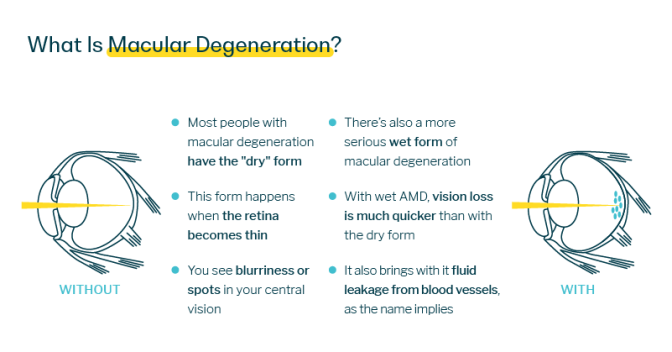Buy one pair of eyeglasses, get a second pair 50% off!
*Restrictions apply. Click here for details.
Understanding Your Macular Degeneration Surgery Options
Macular degeneration is a progressive eye disease that affects the macula, the central part of the retina responsible for sharp, detailed vision. As the condition worsens, individuals may experience blurry or distorted central vision, making daily activities—such as reading, driving, and recognizing faces—more challenging. Although there is no cure for macular degeneration, several surgical and non-surgical treatments can help slow progression and preserve remaining vision.
For some cases of wet macular degeneration, laser surgery may be a treatment option. This procedure works by targeting and sealing abnormal blood vessels that contribute to macular damage, stabilizing retinal health and helping to prevent further vision loss. However, not all patients require or benefit from laser treatment, and the most suitable approach depends on the severity and type of macular degeneration affecting the individual.
Understanding available treatment options is essential to making informed decisions about your eye health. Keep reading Grene Vision Group’s guide to learn more about macular degeneration, potential treatment approaches, and what to expect if laser surgery is recommended as part of your care plan.
The Two Forms of Macular Degeneration

Macular degeneration is a progressive eye disease that results from age-related changes in the macula, the central part of the retina responsible for sharp, detailed vision. While vision loss may develop gradually, macular degeneration can significantly affect daily activities, including reading, driving, and recognizing faces.
There are two primary types of age-related macular degeneration (AMD): dry AMD and wet AMD. Understanding the differences between these forms is crucial for early diagnosis, effective treatment, and long-term vision preservation.
Dry AMD
Approximately 80% of macular degeneration cases are classified as dry AMD¹. This form occurs when the macula gradually thins, leading to the accumulation of drusen, small yellow protein deposits that interfere with normal visual processing. As the condition progresses, individuals may experience blurry or distorted central vision, making routine tasks more difficult over time.
Although dry AMD advances more slowly than wet AMD, it can still lead to significant vision impairment if left unmanaged. While no cure currently exists, eye doctors often recommend lifestyle changes and nutritional supplements containing antioxidants, zinc, lutein, and zeaxanthin, all of which may help slow disease progression and support macular health.
Wet AMD
Wet AMD is less common but more severe. This form of the disease occurs when abnormal blood vessels develop beneath the retina. These fragile vessels tend to leak blood and other fluids, leading to scarring and irreversible macular damage.
Because wet AMD progresses rapidly, it can cause significant central vision loss in a short period if left untreated. Early detection through routine eye exams is essential for preserving vision. If diagnosed in time, treatments such as anti-VEGF injections and laser therapy can help slow abnormal blood vessel growth, reduce fluid leakage, and prevent further deterioration of vision.
Treatment Options for Macular Degeneration
The key to preserving vision with macular degeneration is early detection and timely treatment. Since treatment strategies differ between dry and wet AMD, it’s essential to schedule an eye exam if you experience symptoms like blurriness, distortion, or dark spots in your central vision. At Grene Vision Group, our eye care specialists will assess your condition and recommend the best approach to slow disease progression and protect your eyesight.
Wet AMD
Wet AMD progresses more rapidly than dry AMD, but effective medical treatments can help slow its advancement and minimize vision loss. Some of the most commonly used treatments include:
Anti-VEGF Injections: Medications such as anti-vascular endothelial growth factor (VEGF) drugs² help prevent abnormal blood vessel growth beneath the retina, reducing fluid leakage and stabilizing vision.
Photodynamic Therapy (PDT): This two-step procedure involves injecting a light-sensitive medication into the bloodstream, followed by a low-energy laser treatment to target and eliminate abnormal blood vessels.
Laser Photocoagulation: A focused laser procedure³ that helps seal leaking blood vessels, preventing further macular damage and reducing the risk of vision loss.
Dry AMD
While no cure exists for dry AMD, research suggests that certain nutritional supplements may help slow its progression. These supplements typically contain antioxidants, zinc, lutein, and zeaxanthin, all of which are known to support macular health.
Beyond supplementation, lifestyle adjustments can also play a role in managing dry AMD. Following a nutrient-rich diet, avoiding smoking, and protecting your eyes from UV exposure are all proactive steps that may reduce the risk of worsening vision loss.
Macular Degeneration Surgery
Laser photocoagulation surgery is a potential treatment for wet macular degeneration, designed to slow disease progression and help prevent further vision loss. While this procedure cannot restore lost vision, it works by sealing off abnormal blood vessels to minimize leakage and reduce further damage to the retina. However, because laser treatment may result in some scarring, it can introduce blind spots in your field of vision. Your Grene Vision Group eye doctor will evaluate whether macular degeneration surgery is a suitable option for you, depending on the severity and location of abnormal blood vessel growth. This treatment is generally most effective when abnormal blood vessels are clustered together rather than spread throughout the retina.
Preparing for Surgery
Before considering laser photocoagulation, your eye doctor will review all available treatment options with you. Since surgery carries some risks, including potential additional vision loss, many patients first try anti-VEGF injections or other non-surgical treatments before opting for laser surgery.
If you and your doctor decide that surgery is the best option, minimal preparation is required. Your eyes will be dilated with special drops before the procedure. Because temporary blurred vision is common after surgery, it is recommended that you arrange for someone to drive you home.
During Surgery
Upon arrival for your procedure, you will be seated comfortably while your doctor begins by dilating your pupils and applying numbing drops or a local anesthetic to ensure your comfort.
Once the procedure begins, you will rest your chin on a support device, and your doctor will place a specialized lens in front of your eye to help focus the laser. You will be asked to look straight ahead or focus on a designated light.
A precisely controlled laser will then be used to target and seal the abnormal blood vessels, preventing further leakage. Each laser pulse will create a brief flash of light, and the number of pulses used will depend on the severity of the condition. The entire procedure is quick and typically lasts about 30 minutes.
Recovering from Macular Degeneration Surgery
Following the surgery, your doctor may cover your eye with a patch or bandage. Your pupils will remain dilated for several hours, and you may experience temporary blurred vision or floaters, which should gradually improve over time.
Your doctor will provide you with post-operative care instructions, including how long to keep your eye covered, what medications you can take for discomfort, and when to return for follow-up visits. It’s important to remember that laser photocoagulation does not cure macular degeneration, nor can it reverse vision loss that has already occurred. However, by sealing off leaking blood vessels, this procedure helps slow the disease’s progression and preserve as much central vision as possible.
If you are experiencing symptoms of wet AMD, scheduling an evaluation at Grene Vision Group can help determine the best treatment plan for your specific needs.
Explore Your Macular Degeneration Options at Grene Vision Group

Think you may need macular degeneration surgery? Find a Grene Vision Group location near you to schedule an appointment. Our team of highly trained eye care professionals provide comprehensive eye care including routine eye exams, preventative care, and treatment.

 316-636-2010
316-636-2010 316-609-2177
316-609-2177